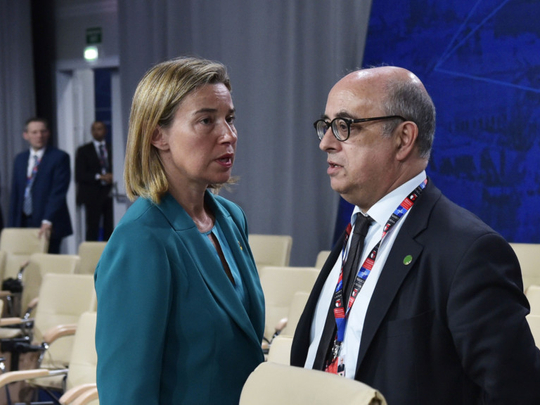
Lost in the shock result of the United Kingdom’s vote to leave the European Union (EU) on June 23, 2016 was the unveiling on June 28 of the much anticipated Global Strategy for the European Union’s Foreign and Security Policy (EUGS) document. The EUGS is the result of a year-long process in which the EU’s High Representative for Foreign Affairs Frederica Mogherini consulted with member states and the larger expert and academic community in an effort to give EU foreign and security policy greater coherence and strategic direction.
To be sure, the Global Strategy document is a far more realistic and therefore less ambitious attempt at defining and outlining the EU’s role in the world than previous attempts, for example the 2003 European Security Strategy. Despite the Brexit vote, which has cast a shadow on some of the report’s conclusions, there is a strong emphasis on unity (“unity of purpose and unity of action”) alongside a determination to place the security of the EU at the forefront of concerns. As such, the strategy calls for greater cooperation in strategic communication among its members to focus on key areas such as counter-terrorism, energy security and cyber security.
At the same time, the document acknowledges that “security at home depends on peace beyond our borders” and therefore calls for pre-emptive peacebuilding and diplomacy efforts alongside multilateralism as the key principle to be followed. While it is recognised that current developments on the international scene have brought about an existential crisis for many regions, the EU also sees this as an opportunity to refocus its energies and adjust the tools it has available to encourage conflict resolution and stability mechanisms. But instead of a focus on democratisation and producing changes in neighbouring regions, the emphasis in the EUGS lies on “balanced engagement” and “resilience”.
The benchmark by which the EU hopes to achieve its objectives is defined as “principled pragmatism”. By this the EU means less grand and global one-size-fits-all ideological strategies meant to demonstrate European values and more focus on individual cases and the specific requirements that are need to resolve certain crises on the ground. Instead of strategic partnerships or the need for a comprehensive European Neighbourhood Policy, the Global Strategy speaks of managing interdependence and of promoting tailor-made partnerships.
What does all of this mean for the GCC countries and specifically for GCC-EU relations? To start with, the document states that the EU “will deepen dialogue with Iran and the GCC countries on regional conflicts, human rights and counter-terrorism, seeking to prevent contagion of existing crises and foster the space for cooperation and diplomacy”.
In this context, the EUGS refers several times to the promotion of cooperative regional orders, meaning that the EU would like to see initiatives such as the Helsinki process, which brought about the Organisation for Security and Cooperation in Europe (OCSE) to also happen in the Middle East and possibly in the Gulf specifically. The GCC states are likely to meet this aspect with some resistance, especially Saudi Arabia, given the current status of Saudi-Iran relations. Ever since the conclusion of the Joint Comprehensive Plan of Action (JCPOA) on Iran’s nuclear programme, most of the GCC states have been sceptical of the perceived rush by the EU and its member states to re-engage with Iran despite the fact that the ultimate impact of the JCPOA remains to be seen. With the EUGS reference to Iran and the GCC countries in the same context, such suspicions will be further enhanced.
One clear casualty of Brexit is likely to be the GCC-EU Free Trade Agreement which has remained shelved in the past few years given that no negotiations on a conclusion to such agreement had taken place. There is also little prospect for progress on issues such as visa facilitation measures given the intense focus on immigration matters in the UK vote and the fact that the EU continues to struggle with a unified migration policy.
With the EU preoccupied with the fallout of the Brexit vote, the attention of EU officials will necessarily be more on internal matters so as to see how the EU integration process can be kept on track rather than seeing how a renewed Global Strategy can be implemented. As a result, wide-ranging foreign policy initiatives are bound to be relegated to a secondary status. In addition, with the exit of the UK, the EU will lose one of its key foreign affairs heavyweights, given the UK’s traditional strong role in global matters and its role as one of the permanent members of the UN Security Council.
What all of this means is less multilateralism and higher bilateralism when it comes to EU-GCC relations. Instead of dealing with an EU whose focus and strength is questionable, the GCC states will prefer to deal with EU members such as France, Germany, and Italy directly. The EU-GCC ministerial meeting to be held on July 20 will provide an initial indication of whether multilateral ties can be reinvigorated. At this stage, there is little to suggest that this will be the case.
Christian Koch is the Director of the Gulf Research Centre Foundation in Geneva, Switzerland.








